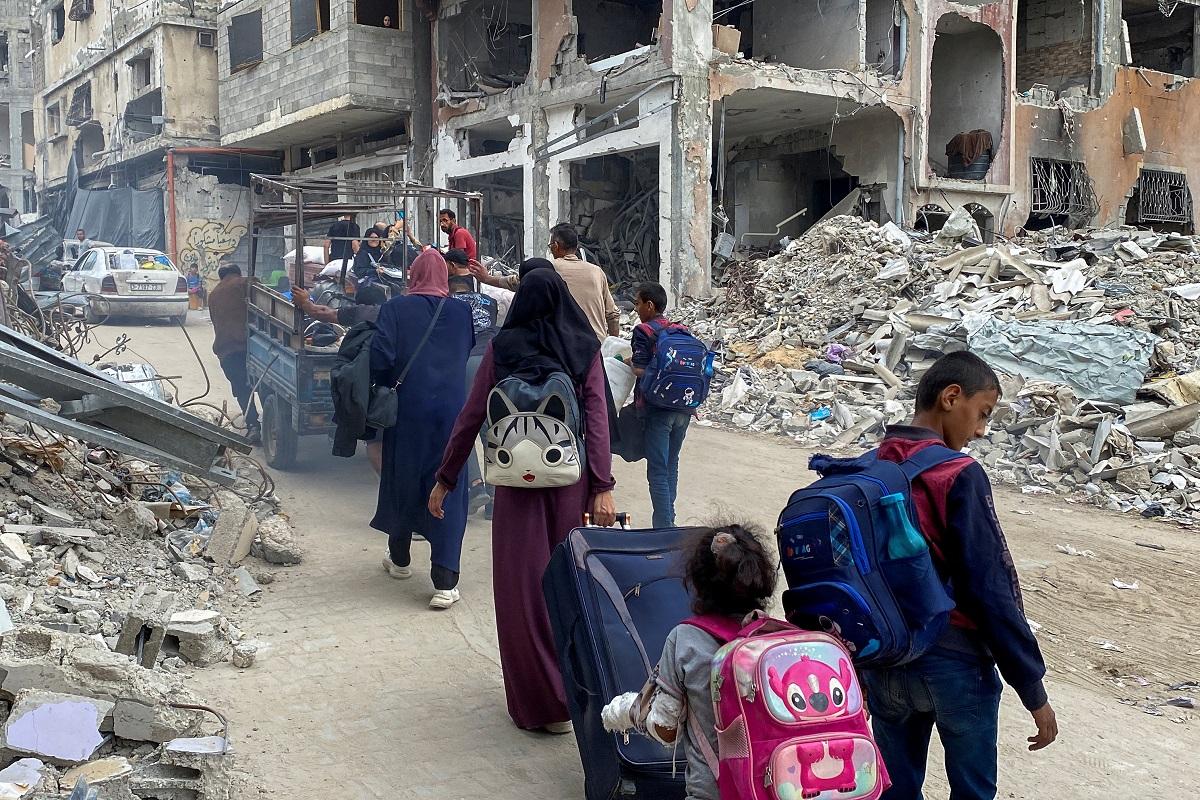UN agency head calls for temporary truce in besieged north Gaza

CAIRO —The U.N. Palestinian refugee agency called on Tuesday for a temporary truce to allow people to leave areas of northern Gaza as health officials said they were running out of supplies to treat patients injured in a three-week-old Israeli assault.
Philippe Lazzarini, head of the UNRWA relief agency, said the humanitarian situation had reached a dire point, with bodies abandoned by roadsides or buried under rubble.
"In northern Gaza, people are just waiting to die," he said in a statement on X. "They feel deserted, hopeless and alone."
"I am calling for an immediate truce, even if for a few hours, to enable safe humanitarian passage for families who wish to leave the area & reach safer places," he said.
The call came as U.S. Secretary of State Antony Blinken arrived in Israel for talks in which he urged its leaders to capitalise on the military's killing last week of Yahya Sinwar, leader of Palestinian militant group Hamas that runs the enclave, by taking steps to end the shattering year-old war.
Washington has called on Israel to allow more humanitarian supplies into northern Gaza and Israel says aid has been delivered in scores of trucks as well as airdrops, but Gaza medics say the aid has not reached them.
Israel's military humanitarian unit, COGAT, which oversees aid and commercial shipments to Gaza, said on Tuesday that 237 trucks containing humanitarian aid, including food, water, medical supplies, and shelter equipment from Jordan and the international community, were transferred to the northern Gaza Strip over the past eight days.
The aid was transferred following thorough security checks, the military said. It added that Israel "will continue to act in accordance with international law to facilitate and ease the humanitarian response to the Gaza Strip".
On Tuesday, Gaza health officials said more than 20 people had been killed by Israeli forces. The bodies of dozens of people were on roadsides and under rubble, inaccessible to rescue teams because of ongoing strikes, they said.
"Many wounded have died before our eyes and we couldn't do anything for them," said Munir Al-Bursh, the director of the Gaza health ministry, who is currently in northern Gaza.
"Hospitals also ran out of coffins to prepare the dead and we have asked people to donate any fabric they have at home."
The Israeli military, which launched an assault against Hamas militants holding out in the northern town of Jabalia this month, says it is evacuating people along designated routes and has filtered out dozens of militants from civilians going south.
Israeli drones circled overhead, calling on Palestinians to evacuate areas around the town of Beit Lahiya, just north of Jabalia where the offensive began earlier this month.
Many Palestinians fear the evacuation orders are part of an Israeli plan to clear the area to create a buffer zone that will enable Israel to control Gaza after the war.
The Israeli military denies the evacuations are part of a wider plan, saying it is moving people to separate them from Hamas fighters.
It said troops had dismantled tunnels and other Hamas infrastructure in Beit Lahiya. Local people said fighting appeared to be confined to hit-and-run attacks by small groups of Hamas militants, "not actual fighting or equal combat," one Palestinian in the area said via a messaging app.
The armed wings of Hamas and Islamic Jihad said they had attacked Israeli forces with anti-tank rockets and mortar fire.
GAZA DEVELOPMENT KNOCKED BACK BY 70 YEARS, SAYS UN
The war in Gaza has devastated the Palestinian economy, which is now 35% smaller than it was at the start of Israel's invasion a year ago, the United Nations development agency said on Tuesday.
UNDP said quality of life indicators such as health and education had been knocked back 70 years to the 1950s.
In northern Gaza, residents said Israeli forces had besieged hospitals, schools, and other shelters housing displaced families and ordered them to leave and head south. They said forces detained dozens of men.
Hussam Abu Safiya, the director of the Kamal Adwan Hospital, said medical services had completely collapsed. "There are no blood units or tubes to drain bleeding from the chest. Most of the medical supplies are not available," he said in a statement.
The overall death toll in Gaza is approaching 43,000, according to the latest health ministry figures, and most of the 2.3 million population is displaced, many in makeshift shelters.
The Israeli offensive was triggered by the Hamas-led attack on Israel on Oct. 7, 2023 in which some 1,200 people were killed and around 250 taken as hostages back into Gaza.—Reuters




